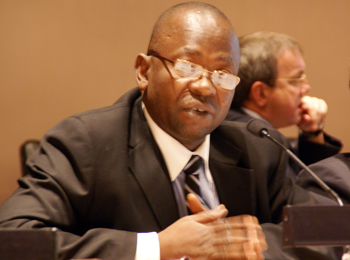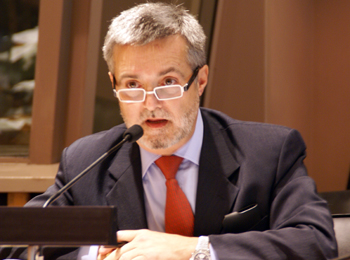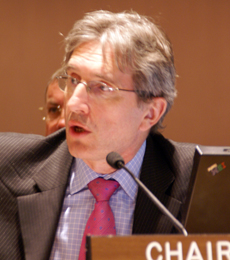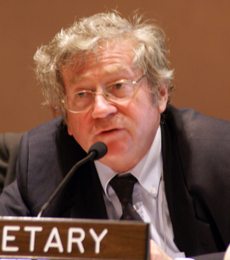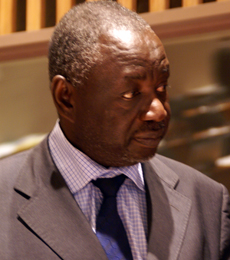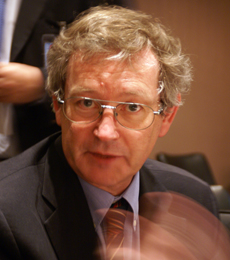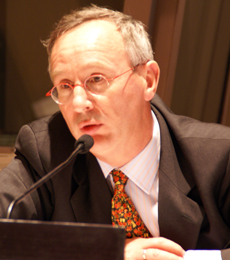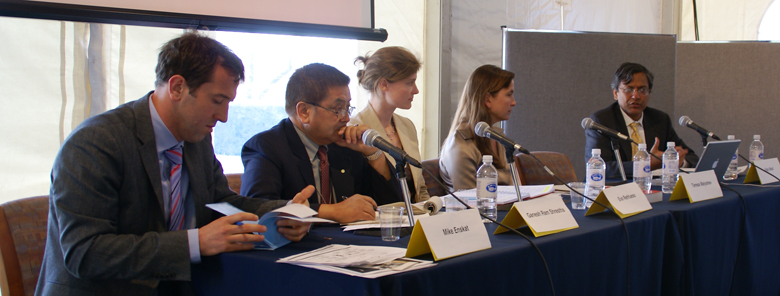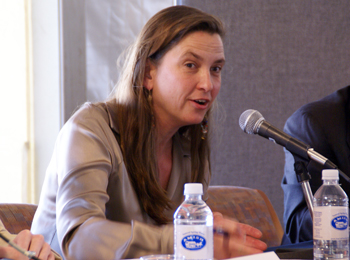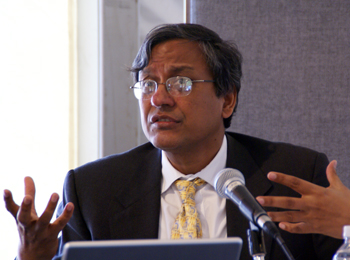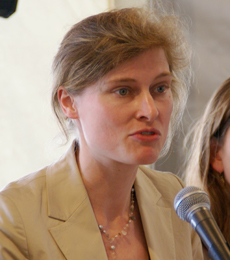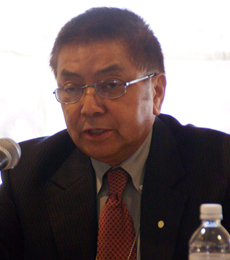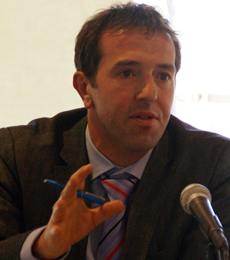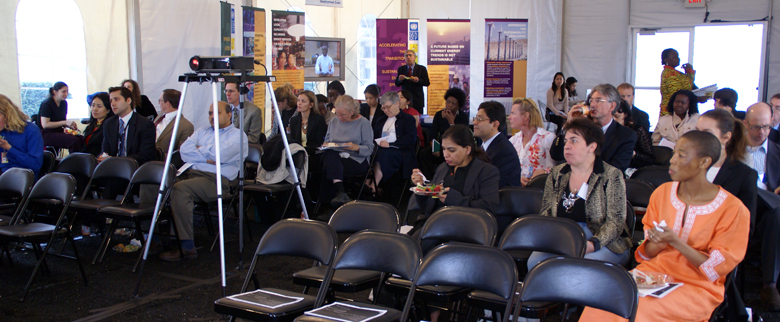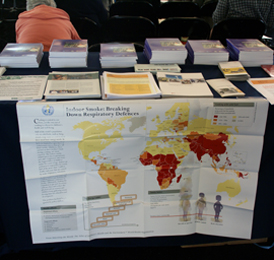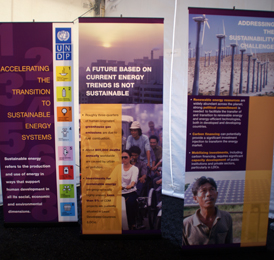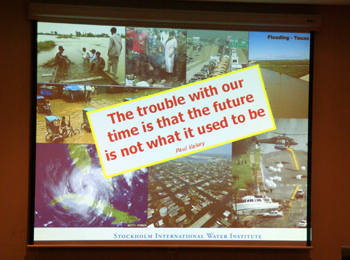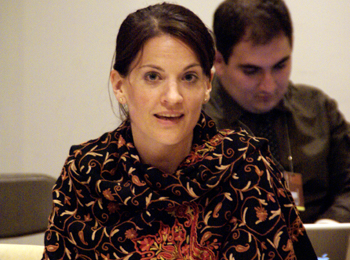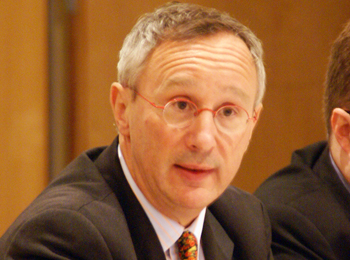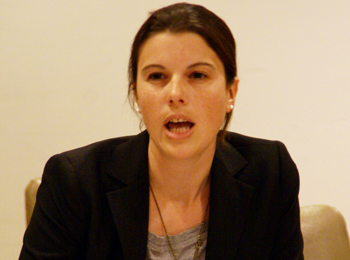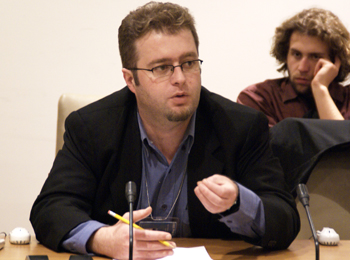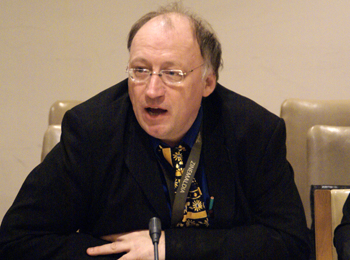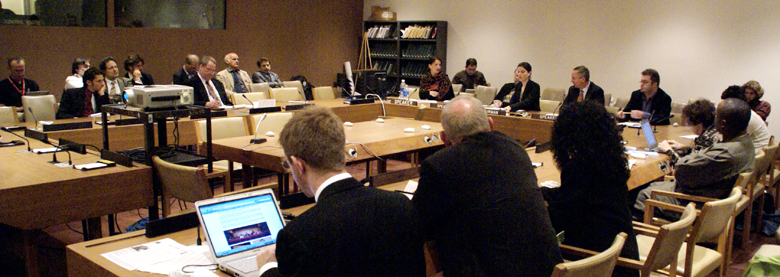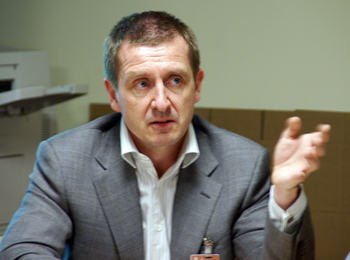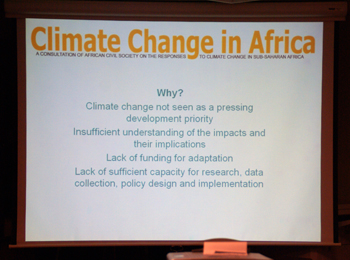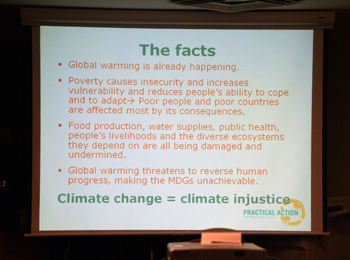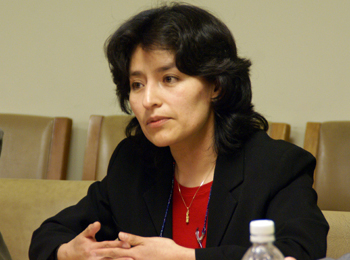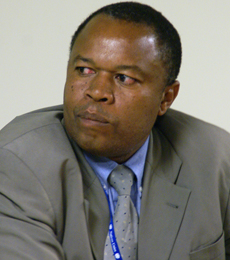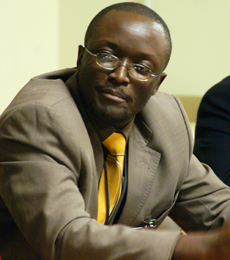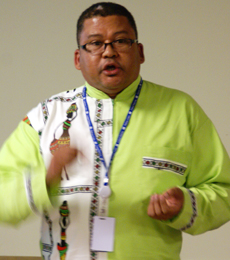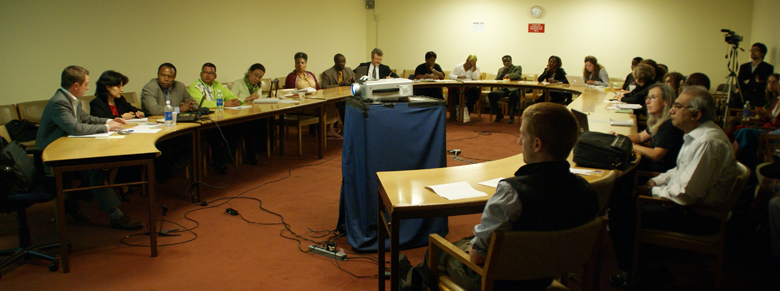 |
||
|
published by IISD, the International Institute for Sustainable Development
in cooperation with the UNDP Secretariat |
|||
|
Special Report on Selected Side Events at the Fifteenth Session of the Commission on Sustainable Development (CSD-15)
|
|||||
| 30 April - 11 May 2007 | United Nations headquarters, New York | |||||
 |
 |
|||
 |
||||
Events convened on Friday, 4 May 2007
|
Christian Brodhag, Interministerial Delegate for Sustainable Development, France, introduced the session by noting that 2 billion people worldwide lack modern access to the heating, lighting and power that are necessary for developing wealth and productivity. He asked panelists to provide perspectives on how to finance and maintain electricity access in rural settings, and how to generate income from the energy supplied. Serge Perez, Right to Energy SOS Future, explained his organization’s mission of ensuring universal access to energy, in particular for achieving the MDGs. He said that major infrastructure projects require investment from institutions such as the World Bank, and that civil society must assist by ensuring good governance at the national level, and communicating local people’s needs to large institutions. Michel Derdevet and Michel Caubet, of RTE, the French transmission system operator, highlighted the role of large electricity networks, which they said allow optimal transfer of electricity and economies of scale across a region, and promote peace and stability between countries. Mahama Kappiah, Economic Community of West African States (ECOWAS), outlined the large potential for hydropower and gas production in the ECOWAS region. He outlined ECOWAS’ policy to provide energy access throughout the region via coordinated generation, interconnection and power exchanges between member states, and harmonized power sector legislation and standards. Caubet then outlined three ECOWAS flagship projects: the West African Gas Pipeline; the West African Power Pool to interconnect the regional electricity market; and a white paper on access to energy services by rural and periurban populations. Aliou Niang, Senegalese Rural Electrification Agency, reported that his country has a rural electrification rate of just 14%. He outlined a sustainable financing mechanism for rural electrification that facilitates financing from international institutions, plus earnings from local use. Christian Stoffaёs, e7 Fund, called for breaking the poverty cycle through universal electrification. He praised CSD-15 for its focus on energy, saying that electrification has often been ignored in international discussions on development despite being vital to improving health, education and productivity. In the discussion, participants noted that doubling Africa’s electricity use would only raise global carbon emissions by 3%. Other speakers discussed a possible gas pipeline from Nigeria to Europe; renewable energy including sustainable biomass energy; and the comparative advantages of decentralized and centralized energy systems. |
||||
|
|||
|
Kamal Rijal, UNDP, welcomed participants to the event and facilitator Vijay Modi, Columbia University, introduced the panel: Teresa Malyshev, IEA; Eva Rehfuess, WHO; Ganesh Ram Shrestha, Centre for Rural Technology, Nepal; and Mike Enskat, GTZ.
Malyshev discussed the 2006 World Energy Outlook’s chapter on “Energy for Cooking in Developing Countries,” saying that in developing countries, 2.5 billion people rely on biomass, including firewood, to meet energy needs for cooking. While saying it would cost approximately US $1.5 billion dollars per year to provide 1.3 billion people with access to clean cooking fuels by 2015, she stressed that the cost would be small compared to other development spending programs and the impacts on oil demand would be negligible. She underscored the need for increased public awareness about the benefits of clean cooking fuel. Modi then asked the panel whether national governments recognize the importance of access to cleaner cooking fuel. Shrestha responded that while access to clean cooking fuel such as LPG is important, national policies in Nepal focus on scaling up the improved cooking stove and biogas programmes. Enskat noted that the issue is increasingly acknowledged in Africa today, as well as in China and India through policy programmes, yet he said that the strategies for implementing these policies are not robust. Rehfuess highlighted the need for awareness raising at the government level. In response to Modi’s question on whether individual countries’ health ministries participate in research on indoor air pollution from cooking and heating with biomass, Rehfuess said that pollution associated with these activities is responsible for approximately 1.6 million deaths per year, primarily in developing countries. She emphasized that it is a difficult issue for the health sector, as doctors and health workers don’t always recognize the links, and noted the need to raise awareness of the issue with health ministers and primary health facilities. Modi opened the floor to questions, with participants discussing, inter alia: the critical role of information at all levels; the importance of investments in capacity building and training and the role of the public sector to initiate these processes; and the need for monitoring and evaluating the effectiveness of the products and programmes. |
|||
issue of access to clean cooking fuels, along with international support to translate small and medium-scale successes into large-scale achievements.
|
|||
|
Jennifer Peer, Stakeholder Forum, pointed out that water, sanitation and energy require an integrated policy approach, yet the CSD has a thematic cluster approach that can act as a barrier to making these links. Cecilia Martinsen, Stockholm International Water Institute, called water “the unpredictable link between climate, society and development,” and outlined areas where climate change could affect water supplies and sanitation, and thus human development. Marc Darras, Gaz de France, made comparisons between energy and water, both of which are needed for agricultural and industrial development and addressing the MDGs. He said that public-private partnerships are often highlighted but the users must also be considered, as financial payback for infrastructure investments depends upon users being able to utilize the energy and water to generate development or income. Richard Sherman, Stakeholder Forum, discussed the water and sanitation agenda within CSD. He said that preparations for CSD-16’s upcoming review of water and sanitation issues have so far been limited and have considered integrated water management but not sanitation. Felix Dodds, Stakeholder Forum, introduced his organization’s proposal for a Global Public Policy Network on Water and Sanitation, which aims to: engage major stakeholders in designing a preparatory process for the water and sanitation review at CSD-16; and prepare inputs to the CSD’s upcoming thematic clusters to ensure that linkages are made between water and other sustainable development issues. He asked interested bodies to join the informal network. Participants discussed, inter alia, monitoring and reviews within the CSD, industrial use of water, and sanitation, water treatment and rural electrification, with one speaker reiterating the need to consider these issues in an integrated, not a sectoral manner. |
|||||
uncertainty surrounding the modalities and substance of CSD-16’s upcoming review of water and sanitation issues, and suggested that delegations at CSD-15 should work to ensure that the review process is meaningful.
|
|||
|
Trevor Rees, LEAD International, highlighted three African regional civil society consultations that took place in Senegal, Kenya, and South Africa during April 2007, on the responses to climate change in sub-Saharan Africa. He described a number of the consultations’ findings, including that: Africa is highly vulnerable to climate change and has low adaptive capability; climate change adaptation is not seen as a pressing development priority; and that human and financial capacity for designing and implementing adaptation is limited in Africa.
Maria Arce Moreira, Practical Action, said that global warming threatens to reverse human progress, making the MDGs unachievable, and therefore emphasized the importance of adaptation, noting that there is no precise information on adaptation costs. She described the difficulty in implementing adaptation stategies due to the differences in government and communities’ definitions of the issue. Stating that Africa is going to be the region most severely affected by climate change, Kenneth Gondwe, University of Malawi, noted that the health, energy, water, fisheries and forest sectors would be impacted. He highlighted the multiple benefits of appropriate technology transfer through an example of solar energy use in a hospital, and said the international community could help by providing, inter alia, technology and skills transfer. Robert Gallagher, Bethelsdorp Development Trust, highlighted principles that emerged from the South Africa regional consultations that communities believe are important for addressing climate change, including that climate change, biodiversity and sustainable development are inseparable, and that climate change has a direct bearing on survival and must be integrated into development planning at the community level. Participants discussed: linkages between adaptation in the North and South; the implications of rephrasing “climate change” as “climate crisis”; the viability of solar energy in Africa; “climate injustice”; and the extent to which indigenous people are suffering from climate change. |
|||
approach to face the challenges and opportunities of adapting to climate change?”
|
|||
|
||
|
Click the above button to go back to our ENB main coverage
|
||
|
|
|
|
|
||
|

